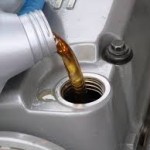 Your car is an indispensable part of your daily life. It allows you to travel at your convenience with relative ease. However, without proper maintenance, your car can be vulnerable to breaking down, leaving you with expensive repair bills and no car. This makes keeping your car running all the more important and one of the most important steps you can take towards keeping your car on the road is to maintain proper fluid levels. The more you know about your vehicle’s fluids, the more able you will be to protect your car from undue wear and tear.
Your car is an indispensable part of your daily life. It allows you to travel at your convenience with relative ease. However, without proper maintenance, your car can be vulnerable to breaking down, leaving you with expensive repair bills and no car. This makes keeping your car running all the more important and one of the most important steps you can take towards keeping your car on the road is to maintain proper fluid levels. The more you know about your vehicle’s fluids, the more able you will be to protect your car from undue wear and tear.
Brake Fluid
Without brakes, you could not stop your car while driving – making driving a truly dangerous proposition. Modern brake systems employ hydraulic pumps to provide effective braking. This means that keeping adequate levels of brake fluid in your vehicle is essential to keep your brakes working properly. Brake fluid is a golden color when it is clean but brown or discolored fluid should be replaced to protect your brakes.
Transmission Fluid
Your vehicle’s transmission is responsible for shifting gears so that your car, truck or SUV can easily navigate different road conditions as well as reverse and park. When your transmission operates without the recommended levels of fluid, it can literally grind your gears and cause expensive damage to your vehicle. When checking your transmission fluid, make sure that it is red in color. Discolored fluid that is brown or black needs to be replaced as well as fluid that smells burnt.
Coolant
Check your coolant levels twice a year to ensure that your engine is protected from overheating. You should always wait for your vehicle to cool down after being turned off for a while to check coolant levels. Coolant is stored in your radiator. Inside the radiator, there should be a line that indicates the proper level to fill your radiator with coolant. If you need to add coolant to your car, make sure to add the same kind that is already in your radiator.
Motor Oil
One of the most common maintenance procedures that virtually every car owner is familiar with is an oil change. Changing your oil is essential to keep your engine running without a hitch. Old, used and dirty oil can cause wear on various engine parts that can lead to various malfunctions. Newer models of cars are being produced with better and better technology and the conventional advice that you should change your oil every 3,000 may be outdated. Check your owner’s manual for specific details about your car’s oil change intervals.
Power Steering Fluid
If, when checking your power steering fluid, you observe fluid that is brown or black in color, change your fluid. Many mechanics recommend checking power steering fluid levels as a part of a routine monthly maintenance checklist for car owners.
